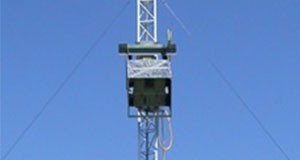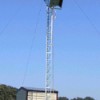 This new report from UF/IFAS researchers provides another set of observation data that can be used to develop better models for accurate prediction of weather and near-term climate. It describes the observations conducted during the MicroWEX-11, a season-long experiment incorporating active and passive microwave observations for bare soil, elephant grass, and sweet corn using a variety of sensors to understand land–atmosphere interactions and their effect on observed microwave signatures. These observations match that of satellite-based passive microwave radiometers and NASA’s recently launched Soil Moisture Active Passive (SMAP) mission. This 96-page report was written by Tara Bongiovanni, Pang-Wei Liu, Karthik Nagarajan, Daniel Preston, Patrick Rush, Tim H.M. van Emmerik, Robert Terwilleger, Alejandro Monsivais-Huertero, Jasmeet Judge, Susan Steele-Dunne, Roger De Roo, Ruzbeh Akbar, Ella Baar, Max Wallace, and Anthony England and published by the UF Department of Agricultural and Biological Engineering, July 2015.
This new report from UF/IFAS researchers provides another set of observation data that can be used to develop better models for accurate prediction of weather and near-term climate. It describes the observations conducted during the MicroWEX-11, a season-long experiment incorporating active and passive microwave observations for bare soil, elephant grass, and sweet corn using a variety of sensors to understand land–atmosphere interactions and their effect on observed microwave signatures. These observations match that of satellite-based passive microwave radiometers and NASA’s recently launched Soil Moisture Active Passive (SMAP) mission. This 96-page report was written by Tara Bongiovanni, Pang-Wei Liu, Karthik Nagarajan, Daniel Preston, Patrick Rush, Tim H.M. van Emmerik, Robert Terwilleger, Alejandro Monsivais-Huertero, Jasmeet Judge, Susan Steele-Dunne, Roger De Roo, Ruzbeh Akbar, Ella Baar, Max Wallace, and Anthony England and published by the UF Department of Agricultural and Biological Engineering, July 2015.
http://edis.ifas.ufl.edu/ae514
Tag: Juan Fernandez-Diaz
Field Observations During the Ninth Microwave Water and Energy Balance Experiment (MicroWEX-9): from March 24, 2010 through January 6, 2011 (AE494)
 The goal of MicroWEX-9 was to conduct a season-long experiment that incorporated passive microwave observations as well as Light Detection and Ranging (LiDAR) observations for a growing season of elephant grass. The variety of sensors would allow for further understanding of the land-atmosphere interactions during the growing season, and their effect on observed passive microwave signatures at 6.7 GHz and 1.4 GHz, as well as LiDAR scans. This 72-page fact sheet was written by Tara Bongiovanni, Pang-Wei Liu, Karthik Nagarajan, Robert Terwilleger, Alejandro Monsivais-Huertero, Jasmeet Judge, Juan Fernandez-Diaz, Daniel Preston, Tyler Cheney, Jason Motsinger, and published by the UF Department of Agricultural and Biological Engineering, January 2013.
The goal of MicroWEX-9 was to conduct a season-long experiment that incorporated passive microwave observations as well as Light Detection and Ranging (LiDAR) observations for a growing season of elephant grass. The variety of sensors would allow for further understanding of the land-atmosphere interactions during the growing season, and their effect on observed passive microwave signatures at 6.7 GHz and 1.4 GHz, as well as LiDAR scans. This 72-page fact sheet was written by Tara Bongiovanni, Pang-Wei Liu, Karthik Nagarajan, Robert Terwilleger, Alejandro Monsivais-Huertero, Jasmeet Judge, Juan Fernandez-Diaz, Daniel Preston, Tyler Cheney, Jason Motsinger, and published by the UF Department of Agricultural and Biological Engineering, January 2013.
http://edis.ifas.ufl.edu/ae494
Field Observations During the Eighth Microwave Water and Energy Balance Experiment (MicroWEX-8): from June 16 through August 24, 2009 (AE476/AE476)
 In order to really accurately predict weather and near-term climate, it is necessary to take into consideration soil moisture in the top meter of soil: it governs moisture and energy fluxes at the land-atmosphere interface, and it plays a significant role in partitioning of the precipitation into runoff and infiltration. This 68-page report presents the observations of an experiment using remotely sensed microwave observations with a view towards incorporating the findings into the models used to estimate energy and moisture fluxes and improve root zone soil moisture estimates. Written by Tara Bongiovanni, Heather Enos, Alejandro Monsivais-Huertero, Blaire Colvin, Karthik Nagarajan, Jasmeet Judge, Pang-Wei Liu, Juan Fernandez-Diaz, Roger De Roo, Yuriy Goykhman, Xueyang Duan, Daniel Preston, Ramesh Shrestha, Clint Slatton, Mahta Moghaddam, and Anthony England , and published by the UF Department of Agricultural and Biological Engineering, August 2011.
In order to really accurately predict weather and near-term climate, it is necessary to take into consideration soil moisture in the top meter of soil: it governs moisture and energy fluxes at the land-atmosphere interface, and it plays a significant role in partitioning of the precipitation into runoff and infiltration. This 68-page report presents the observations of an experiment using remotely sensed microwave observations with a view towards incorporating the findings into the models used to estimate energy and moisture fluxes and improve root zone soil moisture estimates. Written by Tara Bongiovanni, Heather Enos, Alejandro Monsivais-Huertero, Blaire Colvin, Karthik Nagarajan, Jasmeet Judge, Pang-Wei Liu, Juan Fernandez-Diaz, Roger De Roo, Yuriy Goykhman, Xueyang Duan, Daniel Preston, Ramesh Shrestha, Clint Slatton, Mahta Moghaddam, and Anthony England , and published by the UF Department of Agricultural and Biological Engineering, August 2011.
http://edis.ifas.ufl.edu/ae476